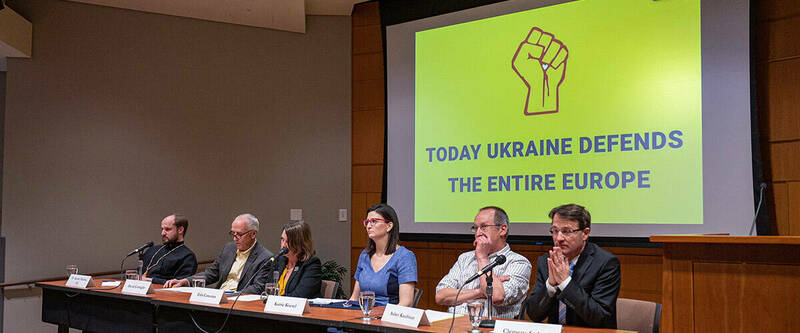Proposal Submission Deadline: currently closed for applications
Overview
In order to deepen research collaboration with an esteemed international partner Notre Dame (ND), USA and Ukrainian Catholic University (UCU), Ukraine are launching a program entitled the ND-UCU Faculty Collaboration Grant Program. Through this jointly advertised program both institutions are inviting proposals for joint faculty research projects with the potential to both achieve international recognition and to generate sustainable research projects for both institutions. Project selection for the Faculty Collaboration Grant Program will be competitive and made jointly by ND and UCU.
Funding and Grants
- Grant funding will be available for joint research projects of 12 months duration
- The ND-UCU Faculty Collaboration Grant projects can extend for any period of time (up to 12 months) during the year period following the disbursement of the grant
- Grants between $10,000 and $25,000 will be made for each joint research project
- It is anticipated that there will be a minimum of 8 research awards
Should a Notre Dame faculty Principal Investigator (PI) have additional resources they can contribute to a specific research project, this would be welcomed.
The Notre Dame-Ukrainian Catholic University Faculty Collaboration Grant Program is contingent upon ND and UCU entering into a mutually acceptable written agreement.
Eligibility at the University of Notre Dame
Regular full-time faculty and special professional faculty of ND are eligible to apply. Projects which include graduate students are welcomed.
Eligibility at Ukrainian Catholic University
Regular full-time faculty of UCU are eligible to apply. Projects which undergraduate and graduate students are welcomed.
Criteria and Outcomes
Proposals from the humanities (including theology and philosophy), social sciences, business (including management) and law will be accepted as will compelling projects from other disciplines. Interdisciplinary projects are welcomed. Proposals, related to the following key areas are particularly encouraged with the areas and listed subthemes intended to be merely indicative rather than exhaustive:
- War and Resilience: Key narratives and discourses about war; its ideological justifications; its root causes; the geopolitical, national, social, economic and psychological consequence of protracted violence and deaths; security as causes or pretexts for war; migration as a response to war and as a political stabilizer or destabilizer; resilience whether it be at a national or personal level; and what makes communities and institutions resilient?
- Religious Dimension: The ways in which religious groups can be either objects of oppression or enlisted to provide ideological justification for a group that oppresses; the ways in which particular expressions of religion are sites of protest and resistance against war; the way in which religions can dialogue together, and contribute to justice, peace, and reconciliation between warring groups inclined to accept the moral authority of these religions.
- Moral and Legal: Considerations not only of the moral responsibility of major actors and sponsors of war and aggression but the collective responsibility of a group or a particular nation; laying bare the legal and extra-legal mechanisms for accountability (e.g., war crime commissions; international tribunals; reparation, truth and reconciliation committees).
- Integral Human Development and Sustainable Reconstruction: Societal, Technological, and Ethical Aspects: A wide ranging and open exploration of the extent to which Catholic Social Teaching can help inform ideas on reconstruction of institutions as well as how attending to the communal effects of trauma should proceed in a post-war situation; also how attention to infrastructure that attends to the dignity of each person and local communities generates social cohesion, contributes to strong institutions, and values that the larger society is prepared to live for and in the extreme to die for.
Plans for international dissemination of the research output should be outlined in the proposal with the following outcomes encouraged:
- Publication(s)
- An application to an external funding body
- Symposium/small conference/workshop
Expenses
It is hoped that budgets will be constructed so as to maximize funding to UCU faculty/researchers and research activities.
Full details of all anticipated costs/activities must be clearly itemized. The budget plan should indicate spending over the full duration of the proposed project. Budget justification will be required.
ELIGIBLE EXPENSES
Expenses for the ND-UCU Faculty Collaboration Grant Program can include:
- A research grant for the UCU faculty Principal Investigator at a rate of up to $500 per month to a maximum of $5000 over a 12-month period*
- A research grant of $1500 per semester (up to 2 semesters) for 1 additional UCU faculty co-principal investigator*
- A research grant of $500 per semester (up to 2 semesters) for up to 2 graduate students at either/both UCU and ND
- Research/Data gathering expenses and outcome dissemination expenses
- Costs, including travel, associated with organizing meetings and workshops related to the research projects (e.g., rooms, catering, etc.)
- IMPORTANT: Due to the unpredictable nature of the conflict in Ukraine and high risks associated with such travel, you must have your trip reviewed by the University Travel Review Committee if you are awarded grant funding. Details about the process and materials required can be found here.
INELIGIBLE EXPENSES
- Computers, Software, Equipment**
*Not available for ND Researchers
**By exception only requests for items of equipment are considered though not encouraged. For any such requests the applicant must be able to demonstrate that the items are both absolutely necessary and not available from other sources
How to Apply
- Proposals are to be prepared jointly and submitted by either the ND PI or the UCU PI through NDG's Online Application system.
- The proposed budget is to be submitted and uploaded separately using the provided budget template.
Sample Application Budget Template
Contact
For more information, please contact:
Geraldine Meehan
Director of Faculty Engagement
Notre Dame Global
Email: gmeehan@nd.edu
Phone: (574) 631-7742
Marianna Pyrih
Head of Research Support Office
Ukrainian Catholic University
Email: mariannapyrig@ucu.edu.ua
Phone: 097 229 49 09
